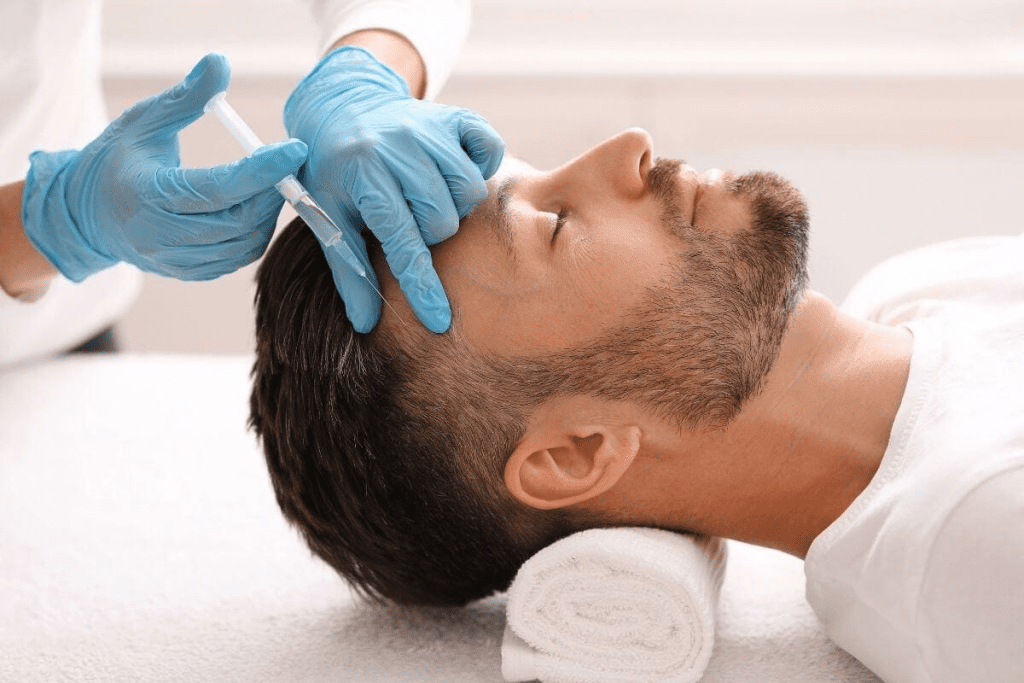
Nearly 65% of cancer patients get radiation therapy as part of their treatment. This treatment can cause hair loss, leading many to wonder ” does radiation cause hair loss and how severe can it be? The impact on hair follicles can be big, leading to partial or complete hair loss in the treated area.
It’s important to understand how radiation therapy affects hair. The amount of hair loss depends on the dosage and area treated. Knowing this can help manage expectations and reduce anxiety
Key Takeaways
- Radiation therapy can cause hair loss in the treated area.
- The extent of hair loss depends on the radiation dosage.
- Understanding the effects of radiation on hair follicles can help patients prepare.
- Hair loss from radiation therapy is a common concern among cancer patients.
- Being informed about radiation therapy side effects can reduce anxiety.
Understanding Radiation Therapy and Its Effects on the Body
Radiation therapy, also known as radiotherapy, is a key part of cancer treatment. It uses high-energy particles or waves to kill or damage cancer cells. This stops them from growing and dividing.
What Is Radiation Therapy?
Radiation therapy targets specific areas of the body with cancer. It can be used alone or with other treatments like surgery and chemotherapy. There are two main types: external beam radiation therapy and internal radiation therapy.
External beam radiation comes from a machine outside the body. Internal radiation therapy uses a radioactive substance placed near the cancer inside the body.
How Radiation Affects Healthy Cells
Radiation therapy aims to kill cancer cells but can harm healthy cells too. The effects on healthy cells can cause side effects, depending on the area and dose. It’s important to know how radiation affects both cancer and healthy cells to manage side effects.
| Type of Radiation Therapy | Description | Effects on Healthy Cells |
| External Beam Radiation Therapy | Radiation delivered from outside the body | Skin irritation, fatigue |
| Internal Radiation Therapy | Radioactive substance placed inside the body | Localized damage, potential for radioactive material to be emitted |
Knowing about radiation therapy and its effects helps patients understand their treatment. It also helps them manage any side effects they might face.
Does Radiation Cause Hair Loss? The Science Explained
The science behind radiation-induced hair loss shows how radiation harms hair follicles. Radiation therapy fights cancer by targeting fast-growing cancer cells. But, it also hits fast-growing cells in hair follicles.
How Radiation Damages Hair Follicles
Radiation halts hair growth by disrupting normal hair follicle cycles. Hair follicles have stem cells that keep hair growing. When radiation hits these cells, they can get damaged or die, stopping hair growth.
The Cellular Mechanism of Radiation-Induced Hair Loss
The cellular mechanism of hair loss from radiation is complex. It involves programmed cell death in hair follicle cells. Radiation damages DNA in these cells, causing them to die and stop hair growth.
Studying how radiation affects hair follicles and cells helps us understand hair loss. It also shows ways to lessen or stop it in people getting radiation therapy.
Types of Radiation Therapy That May Cause Hair Loss
There are many types of radiation therapy, each with its own risk of causing hair loss. Knowing about these types helps manage side effects better.
External Beam Radiation
External beam radiation therapy uses a machine outside the body to send beams to the tumor. This method can lead to hair loss, especially if the area treated has hair follicles.
Internal Radiation (Brachytherapy)
Brachytherapy places a small radioactive source inside or near the tumor. It has a focused effect but can still cause hair loss if it’s near hair-bearing areas.
Systemic Radiation Therapy
Systemic radiation therapy uses radioactive substances that travel through the blood to reach cancer cells everywhere. This method has a higher risk of causing hair loss all over the body.
| Type of Radiation Therapy | Method of Delivery | Potential for Hair Loss |
| External Beam Radiation | Machine outside the body | High, if radiation field includes hair-bearing areas |
| Internal Radiation (Brachytherapy) | Radioactive material inside or near the tumor | Moderate, depending on proximity to hair follicles |
| Systemic Radiation Therapy | Radioactive substances through the bloodstream | High, due to systemic distribution |
Factors That Determine Hair Loss During Radiation Treatment

How much hair loss patients experience during radiation therapy depends on several factors. Knowing these can help both patients and doctors manage expectations. It can also help lessen the bad effects on hair.
Radiation Dose and Fractionation
The dose and fractionation of radiation therapy are key in determining hair loss. A higher radiation dose tends to cause more hair loss. Fractionation, or breaking the total dose into smaller parts, can also affect hair loss.
While fractionation helps protect healthy cells, it may not stop hair loss completely.
Treatment Area and Hair Follicle Proximity
The area being treated is very important. Radiation to areas with hair follicles, like the scalp, increases hair loss risk. The closer the treatment area is to hair follicles, especially at the back of the head, raises the risk of hair loss.
Individual Patient Factors
Individual factors, like overall health, age, and genetics, also play a role. Some people may be more resistant to radiation’s hair effects. Others might lose more hair.
Understanding these factors helps patients prepare for hair loss from radiation therapy. Doctors can use this knowledge to make treatment plans better. They can also offer support to lessen hair loss.
Timeline: When Does Hair Loss Occur During Radiation Treatment?
It’s important for patients to know when hair loss might happen during radiation therapy. Many worry about losing their hair during treatment.
Early Signs of Radiation-Induced Hair Loss
The early signs of hair loss from radiation start in 2-3 weeks. At first, you might see hair thinning or changes in how your hair feels.
As treatment goes on, hair shedding gets worse. It can be tough, but knowing it’s part of treatment helps.
Progression of Hair Thinning and Shedding
How fast hair thins and sheds varies from person to person. The dose of radiation and where it’s applied affect how much hair is lost.
Hair shedding usually gets worse around the third or fourth week. It might keep going until treatment ends. After that, shedding slows down.
Is Hair Loss from Radiation Temporary or Permanent?
Understanding hair loss from radiation therapy depends on the dose and area treated. The permanence of hair loss varies based on several factors. These include the radiation dose and the area treated.
Factors Determining Permanence of Hair Loss
The dose and fractionation of radiation therapy are key. Higher doses can cause permanent damage to hair follicles.
Other factors like overall health and genetics also matter. The area treated also impacts the chance of permanent hair loss.
High-Dose vs. Low-Dose Radiation Effects
High-dose radiation therapy often leads to permanent hair loss. Low-dose treatments are less likely to cause permanent damage.
| Radiation Dose | Likelihood of Permanent Hair Loss |
| Low Dose (<10 Gy) | Less likely |
| Moderate Dose (10-20 Gy) | Possible |
| High Dose (>20 Gy) | More likely |
The table shows that higher doses increase the risk of permanent hair loss. Patients getting high-dose radiation should prepare for possible long-term hair loss.
Radiation to Specific Body Areas and Hair Loss Patterns
Radiation’s effect on hair loss varies by body area. Radiation therapy, used for many cancers, can lead to hair loss in different ways. This depends on where the radiation hits.
Brain Radiation and Scalp Hair Loss
Brain radiation often causes hair loss on the scalp. The scalp is very sensitive to radiation. Even small doses, like 2 Gy, can lead to a lot of hair loss. How much hair is lost depends on the radiation dose and how it’s given.
Neck and Throat Radiation
Radiation to the neck and throat can cause hair loss in these spots. Hair follicles in these areas can be damaged by radiation. This leads to thinning or complete hair loss. The pattern of hair loss varies with the radiation field and dose.
Chest and Other Body Areas
Radiation to the chest is less likely to cause hair loss than the scalp or neck. But, it can still lead to hair loss on the chest or underarms if those areas are in the radiation field. Radiation to other parts, like the pelvis or limbs, can also cause hair loss in those areas.
It’s important to understand how radiation affects different body areas. This helps manage expectations and plan treatments. Knowing how radiation impacts hair loss in various parts of the body helps both patients and healthcare providers prepare and reduce these effects.
Hair Loss at the Back of Head: Why Radiation Affects This Area
Hair loss at the back of the head is a common side effect of radiation therapy. This is especially true for those with brain and head/neck cancers. It’s important to understand why this happens by looking at the anatomy and how radiation is placed.
Anatomical Considerations
The head and neck’s anatomy plays a big role in hair loss from radiation. The back of the head is more likely to be affected. This is because it’s close to areas like the brain and lymph nodes that radiation often targets.
Radiation Field Placement for Brain and Head/Neck Cancers
When treating cancers in these areas, radiation beams often go through or near the back of the head. Where the radiation field is placed affects how much hair loss happens.
The table below shows how different radiation field placements can impact hair loss at the back of the head:
| Radiation Target | Typical Radiation Field Placement | Likelihood of Hair Loss at Back of Head |
| Brain Tumor | Whole brain or localized to tumor site | High |
| Head/Neck Cancer | Neck and lower head region | Moderate to High |
| Other Head/Neck Areas | Varies depending on specific location | Variable |
Knowing these details can help patients and doctors prepare for and maybe lessen hair loss during radiation therapy.
Comparing Hair Loss from Radiation vs. Chemotherapy
Both radiation therapy and chemotherapy can cause hair loss in cancer patients. But, they work in different ways and affect the body differently. Knowing these differences helps patients understand what to expect and make better choices.
Mechanism Differences
Radiation therapy damages hair follicles directly in the treated area. It targets fast-growing cells, including cancer and hair follicles, causing hair loss. On the other hand, chemotherapy affects the whole body. It targets fast-growing cells everywhere, including hair follicles, leading to hair loss all over.
Pattern and Onset Differences
The way hair loss happens and when it starts is different for each treatment. Radiation therapy mainly affects the treated area, while chemotherapy causes hair loss all over. Hair loss from radiation starts in 2-3 weeks, and from chemotherapy in 1-2 weeks.
Recovery Differences
Recovering from hair loss also varies. Hair growth after radiation therapy can be slow and unpredictable. But, after chemotherapy, hair usually grows back in 3-6 months after treatment ends.
In summary, radiation therapy and chemotherapy both lead to hair loss but in different ways. Understanding these differences helps patients prepare for and manage their hair loss better.
Preventing and Minimizing Hair Loss During Radiation Therapy
Patients don’t have to lose a lot of hair during radiation therapy. New ways to prevent hair loss are emerging. Hair loss, or alopecia, is a common side effect. But, with the right strategies, its impact can be lessened.
Scalp Cooling Techniques
Scalp cooling is a method to reduce hair loss during radiation therapy. It works by cooling the scalp. This makes blood vessels constrict, reducing radiation to hair follicles.
This technique is effective in minimizing hair loss. It works best when used with certain types of radiation therapy.
Radiation Shielding Options
Radiation shielding uses protective materials to block or reduce radiation. It’s useful for patients getting radiation therapy near hair follicles. Shielding helps prevent unnecessary radiation exposure.
This can help keep hair in areas not in the main radiation field. It’s a valuable tool for preserving hair.
Emerging Preventative Treatments
Research is ongoing to prevent hair loss during radiation therapy. Several new treatments are showing promise. These include medicines to protect hair follicles and advanced radiation techniques.
These new methods aim to target tumors more precisely. They spare surrounding tissue, including hair.
Exploring these preventive measures helps patients and healthcare providers. Together, they can lessen the impact of radiation therapy on hair. This improves the overall treatment experience.
Hair Care During Radiation Treatment
For patients getting radiation treatment, gentle hair care is key. It helps protect the scalp and any remaining hair. The scalp and hair can get sensitive, so special care is needed to ease discomfort and aid healing.
Gentle Hair Care Practices
Use lukewarm water and a mild shampoo when washing your hair. Hot water can take away natural oils, and harsh shampoos can irritate the scalp. Massage the shampoo gently with your fingertips and rinse well. Don’t rub or scrub your scalp to avoid irritation.
Tips for Gentle Hair Care:
- Use a soft-bristled brush or a wide-tooth comb to prevent hair breakage.
- Stay away from heat styling tools like flat irons or curling irons to protect your hair and scalp.
- When towel-drying, be gentle; consider using a microfiber towel or an old t-shirt to reduce friction.
Best Shampoos and Products for Radiation-Affected Hair
Choosing the right shampoo and hair care products is important during radiation treatment. Opt for fragrance-free and hypoallergenic products to lower irritation risk. Some people find sulfate-free shampoos help keep their scalp healthy.
For product recommendations, talk to your healthcare team or a dermatologist.
Scalp Care and Protection
It’s vital to protect your scalp from irritation during radiation treatment. Avoid extreme temperatures and be careful outside to shield your scalp from the sun. Wearing a hat or scarf can offer extra protection.
Additional Scalp Care Tips:
- Apply a gentle, fragrance-free moisturizer to your scalp to keep it moist.
- Don’t scratch or pick at your scalp to prevent infection or irritation.
Hair Regrowth After Radiation Therapy
Many patients wonder if their hair will grow back after radiation therapy. The good news is yes, it usually does. But how fast and how well it grows back can vary a lot.
Timeline for Hair Regrowth
Hair regrowth after radiation therapy takes time. It can take anywhere from a few months to over a year. Usually, you’ll start seeing new hair in 3 to 6 months. But this can change based on the type of radiation and your own health.
What to Expect During the Regrowth Process
During regrowth, your hair might change in texture and color. It could be finer or feel different than before. You might also notice it’s grayer or more brittle at first.
The regrowth journey has a few stages:
- Initial regrowth: Fine, soft hair starts to appear.
- Progression: Hair becomes thicker and more robust over time.
- Maturation: The texture and color of the regrown hair stabilize.
Factors Affecting Regrowth Success
Several things can affect how well your hair grows back after radiation therapy. These include:
| Factor | Description | Impact on Regrowth |
| Radiation Dose | The amount of radiation exposure. | Higher doses can lead to more significant hair loss and potentially slower regrowth. |
| Radiation Type | External beam radiation vs. internal radiation. | External beam radiation is more likely to cause hair loss in the treated area. |
| Patient Health | Overall health and nutritional status. | Better health and nutrition can support healthier regrowth. |
Knowing these factors and keeping your health in check can help your hair grow back better.
Latest Research and Advancements in Radiation-Induced Hair Loss
New studies show that better ways to fight cancer might also protect hair. Scientists are working hard to find treatments that don’t harm hair follicles as much.
New Radiation Delivery Techniques
New methods in giving radiation are being tested to lessen hair loss. These include IMRT and proton therapy. They aim to hit tumors more accurately, sparing healthy hair follicles.
Pharmacological Interventions Under Study
Researchers are looking into medicines to stop or lessen hair loss from radiation. They want to find drugs that shield hair follicles and help hair grow back.
Future Directions in Hair Loss Prevention
Future studies will likely mix new radiation methods with medicines to fight hair loss better. They might also explore how genetics affect how well hair can withstand radiation. This could lead to treatments tailored to each person.
Key Takeaways:
- New radiation delivery techniques can reduce hair loss.
- Pharmacological interventions show promise in preventing radiation-induced hair loss.
- Future research will likely combine these approaches for better outcomes.
Conclusion: Managing Expectations and Finding Support
Dealing with radiation therapy can be tough, especially when you might lose your hair. It’s important to know how radiation therapy can cause hair loss. This helps patients get ready for what’s ahead.
Patients can guess how much hair loss they might face. This depends on the dose of radiation and where it’s applied. But, it’s also key to find support from doctors, support groups, and family. This helps deal with the emotional side of losing hair.
New ways to reduce side effects of radiation therapy, like hair loss, are being found. Patients should talk to their healthcare team about their situation. This way, they get advice that fits their needs.
Handling side effects of radiation therapy is all about managing what you expect and finding support. This lets patients focus on getting better. They know they’re not alone in their fight.
FAQ
Does radiation therapy cause hair loss?
Yes, radiation therapy can cause hair loss, especially in the treated area. The amount of hair loss varies based on the radiation dose and type. It also depends on the patient’s individual factors.
Will I lose my hair with radiation treatment?
It depends on the treated area and radiation dose. If the treatment targets a specific area, like the head or neck, you might lose hair there.
Is hair loss from radiation temporary or permanent?
Hair loss from radiation can be either temporary or permanent. It depends on the treatment dose and length. Sometimes, hair grows back after treatment ends.
How long does it take for hair to regrow after radiation therapy?
Hair regrowth time varies. It can take months to a year or more after radiation therapy.
Can hair loss from radiation be prevented?
There’s no sure way to prevent hair loss from radiation. But, scalp cooling and radiation shielding might help reduce hair loss.
What is the best shampoo for hair loss after radiation?
Use gentle, sulfate-free shampoos during and after radiation therapy. Your healthcare provider can give specific shampoo recommendations.
Does radiation to the brain cause hair loss?
Yes, brain radiation can lead to hair loss, especially on the scalp. Hair loss extent depends on treatment dose and duration.
Can radiation therapy cause hair loss at the back of the head?
Yes, radiation therapy can cause hair loss at the back of the head. This is more likely if the treatment area includes the neck or head.
How does radiation therapy compare to chemotherapy in terms of hair loss?
Both radiation and chemotherapy can cause hair loss. But, radiation affects the treated area more directly. Chemotherapy can lead to more widespread hair loss.
Are there any new treatments or research on preventing hair loss from radiation?
Yes, research is ongoing to find new ways to prevent or reduce hair loss from radiation. This includes new radiation techniques and medicines.
Can hair grow back after radiation-induced alopecia?
Yes, hair can grow back after radiation-induced alopecia. The chance of regrowth depends on treatment dose, duration, and individual factors.
Is hair thinning permanent after radiation therapy?
Hair thinning after radiation therapy can be permanent. It depends on treatment dose and duration. In some cases, hair may regrow, but it might be thinner or more brittle.
References
- In ‘t Ven, L., et al. (2022). Pre-treatment visualization of predicted radiation-induced alopecia in brain tumor patients.. https://www.ncbi.nlm.nih.gov/pmc/articles/PMC8856945/
- Chidambaram, S., et al. (2020). Alopecia following cranial stereotactic radiosurgery. Radiotherapy and Oncology. https://www.sciencedirect.com/science/article/abs/pii/S0967586820314612



































